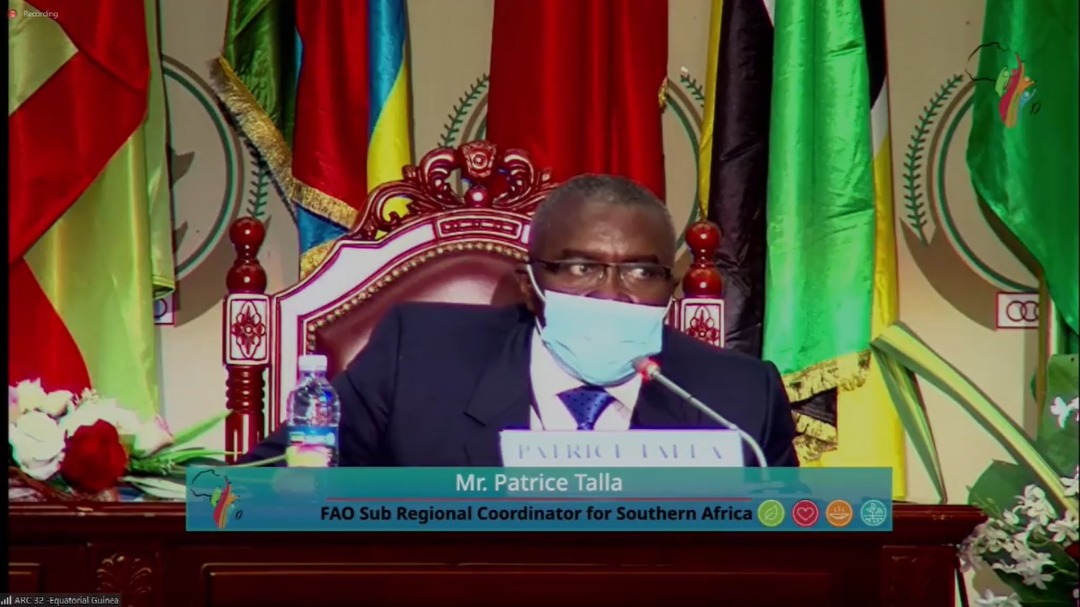|
Getting your Trinity Audio player ready…
|
On Equatorial Guinea’s capital island of Malabo, agriculture ministers from across Africa are meeting this week to discuss solutions to the growing hunger crisis, at a conference convened by the Food and Agriculture Organization of the United Nations (FAO).
The 32nd Session of the FAO Regional Conference for Africa (ARC32) opened with a call from the FAO Assistant Director-General and Regional Representative for Africa Abebe Haile-Gabriel to learn lessons from the COVID-19 pandemic to trigger urgent action at national level.
“Collectively, we have learned to do things differently, to go digital like never before, and to quickly forge new partnerships to overcome threats. That same agility and spirit of collaboration is needed now for the silent pandemic of poverty, hunger and undernourishment and extreme vulnerabilities to shocks in Africa,” he said.
More than 50 government ministers from African member countries are taking part in the hybrid conference, as well as representatives from observer countries, the African Union, donor organizations, civil society and the private sector. Hundreds of delegates will join the Zoom sessions over the next four days, and many more will watch the live webcast.
“We have to work together to exchange experiences to face these difficulties together,” said H.E. Francisca Eneme Efua, Minister of Agriculture, Livestock, Forests, and Environment of the Republic of Equatorial Guinea and Chairperson of ARC32. “This conference gives us an outstanding opportunity to deal with the issues facing Africa. I ask all delegations to ‘put everything on the table’ so we can come up with ministerial consensus,” she said.
Deepening hunger crisis
Even before the COVID-19 pandemic, there were more than 280 million undernourished people in Africa. In 2020, the region recorded the sharpest rise in the prevalence of undernourishment – covering 21 percent of the population which is more than double that of any other region.
A devastating drought in the Horn of Africa has brought many rural families to their knees and triggered warnings of potential famine in Somalia.
Acute food insecurity in the Sahel and West Africa almost quadrupled between 2019 and 2022 –jumping from 10.8 million people in 2019 to 40.7 million people in 2022, with millions more at risk of slipping into crisis levels of hunger.
Sky-rocketing global food prices and strains on food supply because of the Russia/Ukraine crisis are likely to push more people into hunger in Africa.
In an opinion piece published in the lead-up to the Conference FAO Director-General Qu Dongyu warned that time is running out. “Without extraordinary efforts by every African country, it will be difficult to meet the aspirations and targets of the Sustainable Development Goals,” he wrote.
The Director-General will speak in person at Wednesday’s opening of the Ministerial Session, and the President of Equatorial Guinea will formally open the session.
Four Betters in focus
The Regional Conference is FAO’s highest governing body in Africa. Over the next four days, delegates from across Africa will deliberate and provide guidance on regional priorities in agri-food systems transformation in Africa.
Underpinning the discussions is the FAO Strategic Framework 2022-2031, which supports the 2030 Agenda through the transformation to MORE efficient, inclusive, resilient, and sustainable agri-food systems for better production, better nutrition, a better environment, and a better life, leaving no one behind.
Delegates taking part on the first day of the Conference discussed FAO’s development of new strategies on science and innovation and climate change.
Highlights in the coming days include a special experience-sharing session among countries on solutions for better production, better nutrition, a better environment, and a better life, and a launch with the African Union of new investment guidelines on youth in agrifood systems.
The Conference ends on Thursday 14 April.
